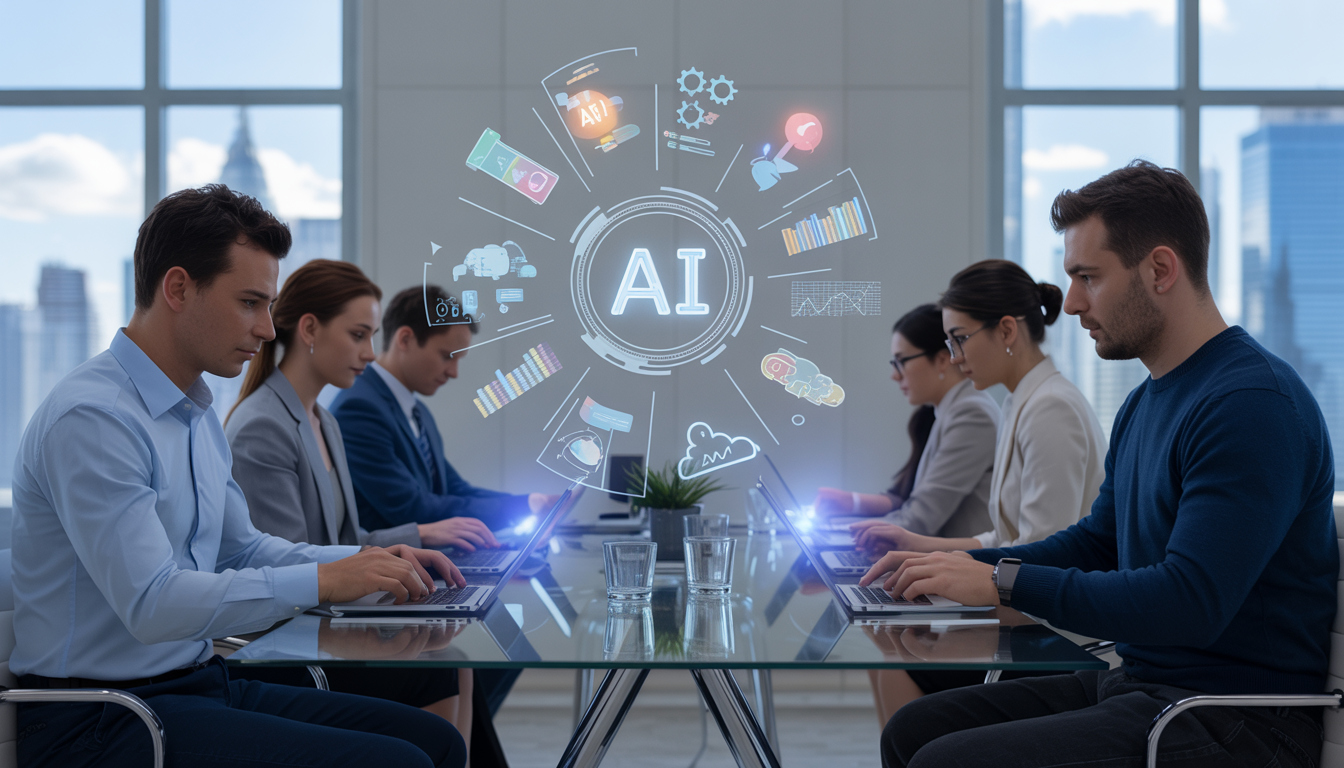
Digital marketers using laptops with AI icons, analytics charts, and digital marketing symbols floating above, representing AI-powered marketing automation and innovation in 2026
AI in digital marketing has moved from industry buzzword to an essential part of every successful marketing strategy. In 2026, artificial intelligence isn’t just powering the background of big advertising platforms—it’s working on the frontlines, helping brands of all sizes attract, engage, and convert customers more effectively than ever.
Marketers today face enormous pressure: audiences are fragmented, ad costs are high, and consumer attention is fleeting. At the same time, there’s more data than anyone could possibly analyze manually. Enter AI marketing tools and digital marketing automation—technologies that analyze trends, predict behaviors, and personalize campaigns in real time. The result? Smarter, faster, and more profitable marketing, no matter your company’s size or budget.
If you want to drive quick traffic, increase ad revenue, or simply stay ahead of the competition, understanding artificial intelligence marketing in 2026 is crucial. Below, we break down how AI is changing the digital marketing game, highlight the latest tools, and share real-world examples of AI-powered strategies that deliver.
Artificial intelligence is deeply woven into the fabric of modern marketing. What used to be reserved for Silicon Valley giants is now accessible to every business owner, agency, and entrepreneur.
The result is clear: brands using AI in digital marketing are outpacing their competitors in both traffic and revenue.
Also Read: Choosing the Right Digital Marketing Agency: What to Look for in 2026
The landscape for AI marketing tools keeps growing. Here are some of the standout platforms and solutions making waves this year:
Example:
An online retailer uses AI to create dozens of unique product descriptions and personalized emails for each customer segment, increasing both click rates and sales.
Example:
A B2B software company uses AI to identify which leads are likely to convert within the next 30 days and automatically adjusts outreach efforts for maximum impact.
Example:
A finance brand’s AI chatbot answers FAQ, gathers customer preferences, and seamlessly transitions warm leads to human advisors—all in a single conversation.
Example:
A travel company runs dynamic ads that showcase different destinations and prices to each user based on their previous searches and in-app behavior.
Example:
A health blog uses AI to identify trending questions, fill content gaps, and ensure every article is optimized for high-intent search terms like “AI in digital marketing” and “digital marketing automation.”
Also Read: Best Payroll Software for Health & Wellness Businesses (Top Picks for 2025-2026)
Digital marketing automation has evolved. In 2026, it’s not just about scheduling posts or sending drip emails—it’s about orchestrating entire customer journeys with AI.
Sephora uses artificial intelligence marketing to deliver product suggestions based on browsing and purchase history. Customers receive emails and notifications tailored to their preferences, dramatically increasing both basket size and repeat purchases.
B2B companies use HubSpot’s predictive AI to score leads and automate nurture tracks. The result: Sales teams focus on the most likely buyers, while AI handles the rest with personalized content and follow-ups.
Retailers and service providers embed ChatGPT for digital marketing in their websites, using AI-powered chat to answer questions, recommend products, and even generate reviews or FAQs on the fly.
SaaS companies use AI grading tools to qualify leads in real time, scoring prospects on behavior, demographics, and engagement. This streamlines the sales funnel and delivers higher conversion rates.
Also Read: Real Estate Crowdfunding: How to Invest in Property with Just $100
Even as AI marketing tools become smarter, challenges remain:
Also Read: How to Choose the Best Business Insurance Online for Small Business Owners
Also Read: How to Start Real Estate Investing Online: Top Platforms and Strategies for Every Budget
AI in digital marketing is the use of artificial intelligence—like machine learning and natural language processing—to automate, optimize, and personalize marketing across digital channels.
Key tools include Jasper AI for content, Salesforce Einstein for analytics, ChatGPT for conversational marketing, SurferSEO for optimization, and Google Ads Smart Bidding for advertising.
AI-driven automation coordinates customer journeys, personalizes content, optimizes ad spend, and improves campaign performance with minimal manual effort.
Benefits include better targeting, increased ROI, cost savings, faster campaign testing, and improved customer experiences.
Yes—privacy, algorithmic bias, and potential loss of human touch are key risks. Brands should use AI responsibly and maintain human oversight.
In 2026, AI in digital marketing is shaping the most successful campaigns and setting a new standard for results. Artificial intelligence marketing gives brands of all sizes the tools to act on data, reach the right customers, and adapt to a fast-changing world. The best marketers blend AI’s speed and insight with human creativity and empathy, delivering smarter campaigns that drive real traffic and revenue. As digital marketing automation continues to evolve, those who harness AI wisely will lead the way.